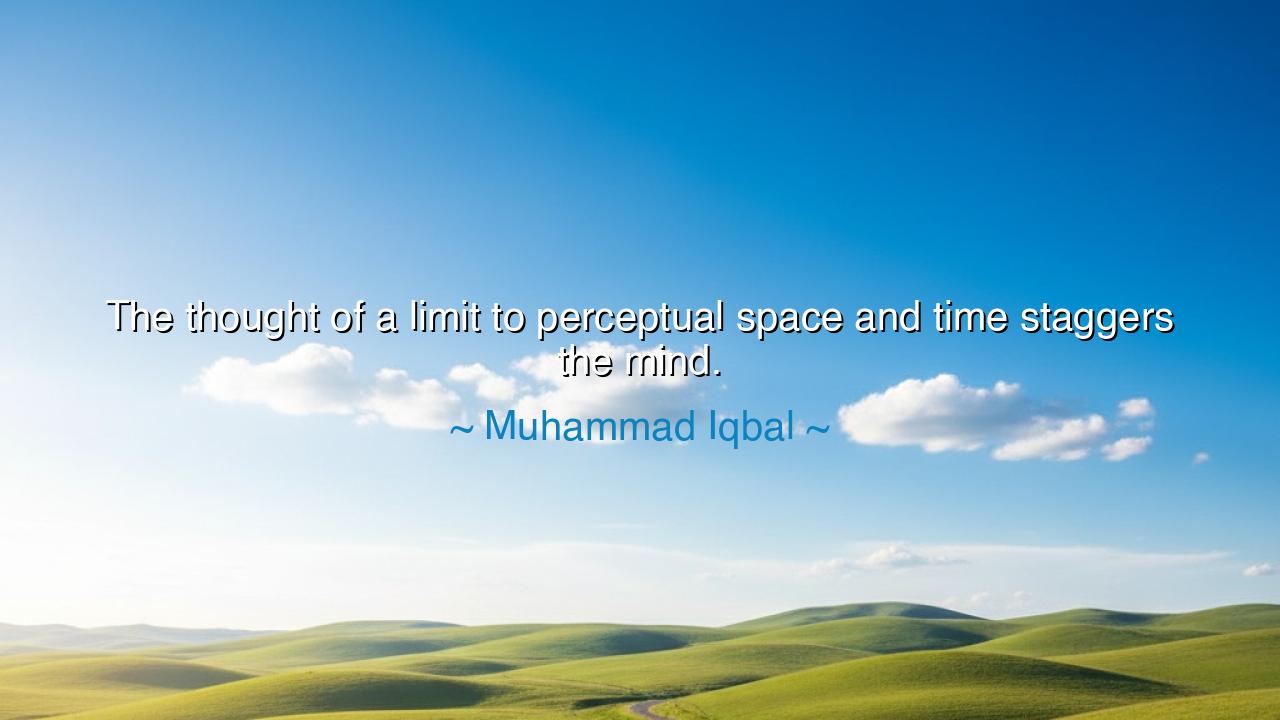
The thought of a limit to perceptual space and time staggers the






Hear now the words of the sage Muhammad Iqbal, who declared with thunderous vision: “The thought of a limit to perceptual space and time staggers the mind.” In this utterance lies both awe and trembling, for he points to the boundless mystery of existence. The human spirit, ever striving to measure, to contain, to explain, is shaken when it confronts the possibility that there might be edges to the infinite. To imagine a wall at the end of space, or a final moment in time, is to feel the ground beneath us crumble and the heavens collapse inward.
For what is space but the stage upon which all forms appear? What is time but the river that carries us from birth to death? If these have boundaries, then all our certainties tremble, for our imagination cannot bear the prison of finitude. The mind, trained to dream in horizons without end, reels at the thought of a final barrier beyond which there is nothing. Iqbal, a poet-philosopher, knew this tension well—he saw that to ponder such a limit is both a humbling and a liberating act, for it forces us to confront the fragility of our perceptions and the grandeur of what lies beyond them.
Consider the tale of Christopher Columbus, who sailed westward upon the uncharted sea. In his age, many feared the edge of the world, imagining a dreadful precipice where ships would fall into nothingness. Yet Columbus dared to test that limit—and in doing so, he discovered not the edge of creation, but new worlds waiting to be known. His voyage is a mirror to Iqbal’s teaching: what staggers the mind is not meant to paralyze us with fear, but to summon forth courage, so that we expand the borders of what is possible.
The ancients too wrestled with this mystery. The Greek philosophers asked: if the universe ends, what lies beyond the boundary? If time had a beginning, what came before? If it has an end, what awaits after the final hour? Each question shattered the limits of perception, reminding mortals that the truth of existence is greater than any vessel of thought. And yet, from this staggering realization was born philosophy, science, and faith. For it is precisely the struggle against limits that drives the human race to grow.
Iqbal’s words are not despair, but fire. He speaks of a mind staggered, not broken; of thought shaken, not destroyed. For when the mind staggers, it awakens. It realizes that its current tools, its narrow lenses, are insufficient, and it yearns to forge new ones. This is how humanity has always advanced: by confronting the impossible, by questioning the unthinkable, by daring to seek beyond the veil of perception. To stagger is the first step to rising higher.
Therefore, O listener, the lesson is this: Do not fear the staggering thought, the question too vast, the mystery too great. Let it humble you, let it ignite awe within you. For it is better to stand trembling before infinity than to sleep content within the cage of the familiar. The mind that accepts its limits never grows; the mind that staggers before them learns to fly.
Practical action lies before you: embrace wonder. Each day, allow yourself to contemplate what lies beyond your current understanding. Read, explore, question, create—push against the limits of your knowledge and perception. When you feel small before the immensity of the stars, or dizzy at the thought of eternity, do not turn away. That staggering is the sign of growth, the summons of the soul to expand.
So remember the teaching of Iqbal: the mind staggers not in weakness, but in awe before infinity. Let that staggering be your strength, for from it arises the courage to seek, the wisdom to question, and the fire to live beyond the confines of the seen.






AAdministratorAdministrator
Welcome, honored guests. Please leave a comment, we will respond soon